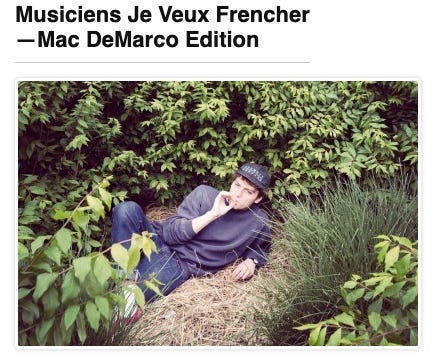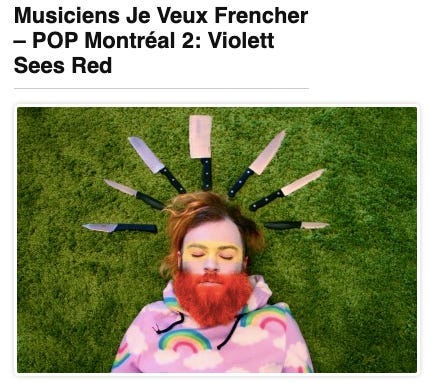I Kissed Musicians for a Living Pt. 2
re-post from season 1
Hello readers! The Ick Season 4 is coming soon—with a new theme, new writers, and a PRINT component. In the meantime, as many of you are new here, please enjoy this re-post from season 1, essays on embarrassment. If you missed it, part one of this essay is here.
Stay tuned for the Season 4 announcement next week! If you haven’t already, please subscribe.
In the 2010s I lived in Montréal and propositioned bands to kiss me.
In part one, I explained that I wrote a column called “Musiciens que Je Veux Frencher,” lovingly called Frencher (hard “r”) by my American editor back home in Austin, Texas.
I was having a blast. My name was on the list six nights a week at Montréal’s seediest hidden venues. I got all access passes for MUTEK, PopMontréal, and JazzFest. I landed exclusive interviews with rising stars like Quebecois rapper Koriass and Grimes-adjacent Majical Cloudz, along with indie darlings like Mac DeMarco, Suuns, and Baths.




At first this sounds cute and funny, but it’s one of my most embarrassing stories. I rarely talk about this time in my life because things ended so badly. Things were becoming increasingly complicated as I wrote the column. But before the internet harassment began, the major complication was catching feelings.
The Heartbreak
In 2012, I fell hard for Roman Rappak, the lead singer of Breton. I’d been quietly fascinated by Breton for a couple years. I ran across their video “15x” on an art blog and loved it. I put their track “The Commission” on all my playlists. When they booked Montréal on their North American tour, I reached out for an interview right away. I was going off script by interviewing a British band instead of a Canadian one. But I knew I could spin it somehow.
The band’s identity was vague. Apart from a sparse website, the only info you could find was a jumble of underground blog interviews and shaky cellphone videos from fans.
When I stumbled into the venue I asked a guy eating a sandwich where to find the band. Roman wiped crumbs off his mouth and stood up. He had bright hazel eyes, red pouty lips, a big toothy smile.
I was starstruck. Oh, wait, Breton is you.
He had an easy, chivalrous manner and a hot British accent. I was unprepared for the interview to start so immediately, but he invited me to join him as he finished his turkey club. I ordered us a round of beers. From there, we couldn’t stop talking. We parted momentarily while he played two sweaty, synth-drenched sets, then reunited backstage. My photographer had bailed, so there was no hope for a photo. I just wanted to spend time with him. We sat together in the venue’s basement, laughing effortlessly. I dropped the auspices of an interview. We told each other our life stories. I was smitten.
At the end of the night, I hesitated as he held open the door of his cab. Instead of climbing in, I kissed him—a soft, lingering, yearning kiss—and turned away. I went home kicking myself that I never told him the concept of the article.
I wrestled all week before the deadline. Should I write the article? Should I call it off? Would Roman feel deceived if he learned I’d intended to kiss him all along? I wrote it anyway, trying to portray my piercing moral turmoil.
After the article published, I never heard a word from him. I assumed he never read it, and that he’d forgotten I ever existed.
A year later, long after my column had stopped running, his band returned to Montréal. I went early to the show, and found Roman at the merch table. I asked, “Do you remember me?” He answered with a pained smirk, “Of course I do. You broke my heart.”
The heartbreak was, ultimately, what burned me out. I’m not sure how many musicians’ hearts I broke (allow me to flatter myself), but it’s clear that my own heart was breaking all the time. Every night I was setting myself up for rejection. There was romance and thrill in the assignment—but also longing.
I was living in Montréal as a broke expat. The city, the freelance writing, the music scene were so novel and exciting that I didn’t recognize my loneliness. These fleeting bursts of romance in music venue basements were my refuge. I had a lot in common with these hard-working musicians. They were broke too. Exhausted. Making art for art’s sake. In love with the craft, but not sure if it would ever pay off or reach a wider audience.
I asked questions like, “Are your parents proud of you?” as I wondered the same thing about myself, writing for a tiny art mag and publishing pictures of me snogging strangers. I’m very sure my parents didn’t send my clips to their church friends.
The VICE Article
When I set aside the Frencher column in pursuit of stable income and a long-term boyfriend, I wouldn’t say things got better, but at least I got more sleep. To commemorate the end of an era, I pitched a recap article to VICE.
In 2014, VICE had more than ten verticals. The homepage ran headlines like “My Life as a Ski Resort Chalet Bitch,” “Does Cocaine Make You Smarter?” and “The Sex Toy Holiday Gift Guide”. I knew my cunty lil column would be a shoo in.
They said yes, and the article went live on November 6, 2014 under the headline “I Tried To French Kiss All the Biggest Artists in Canada”.
Honestly, it wasn’t that good. I buried the lead. I rambled then rushed. You can still read it here. But the headline was baity enough to open a firehose of Twitter hate.
I was called a slut and a whore. I was told I was making it harder for women journalists to be taken seriously. I was hailed as a disgrace to the profession. I was written off as a stupid girl with a stupid prank.
It was horrible and humiliating. It caused me to question myself as a writer and a feminist. I felt deeply ashamed, and blamed myself for inviting the abuse. I don’t tell most people about this column for fear they will judge me as debauched, unprofessional.
Over the past nine years, I’ve thought a lot about their criticism. In a patriarchal world where women are only as valuable as they are sexually desirable, was it wrong to use that power to my advantage? By doing so, was I endorsing the objectification of women, and the patriarchy as a whole?
These days, I just wanna say: girl, calm down. Let’s take a breath and examine our internalized Madonna/Whore Complex and scarcity mindset. Instead of reacting from jealousy, fear, or shame, we’ve got to have a systems-level theory of change. Was I the problem, really? A kid, desperate for a byline, grasping for a headline that would get clicks. Or was it the all-male VICE editorial staff that would only give women headlines like “My Life as a Ski Resort Chalet Bitch”?
I’m not excusing my behavior. It’s true that I was exploiting my youth and beauty. I was wielding my sexual power in a male dominated field. And that feels weird and wrong these days. But did the women journalists calling me a slut on Twitter think they were going to change the system by shaming me? I don’t believe my VICE article moved the needle that much. But perhaps that’s easy to rationalize in hindsight.
The Heartbreak
The night Roman told me “you broke my heart,” I took him back to my place after the show. We sat on my porch, drunk and nervous to be reliving this old storyline. He admitted he’d read the article when it was published, then re-read it a year later on his return to Montréal, wondering if he would see me again. He told me he was angry, he felt betrayed. “I thought you really liked me,” he said. “I thought it was real.”
“It was real,” I pleaded.
But was it?
Had I tricked him? tricked myself? Gotten swept up in the fantasy and forgotten the conceit—the deceit—of the article itself?
After nearly a decade of reflection, I can answer this confidently: No.
No one was tricked. No one was deceived. Those feelings were wild and real. Journalism is rarely objective. And love and art and heartbreak are all intertwined.
For an assignment that kept me out all night in crowds of people, I had been struggling to make friends. The indie music scene was tight knit, elitist, painfully hip, and I was always alone. I chose crowded shows where I could be pressed between bodies, jumping and dancing with a group of peers, lit up in a frenzy of togetherness. Live music provided the physical touch and social belonging I was starved for in my life outside the venue.
When I was talking to Roman backstage, we shared the sleep deprivation, high blood alcohol, and yearning for validation that can simulate falling in love. I felt that helpless falling feeling of true understanding, relief. Montréal was already breaking my heart every day; I wanted to fall in love, I was inviting it in. In that interview, when I looked into Roman's twinkling eyes, laughing casually about disappointing our parents, I felt recognized, less alone.
In the VICE article, I wrote my experiment had wild variables and no control. I concluded it “was just bad science”. But these days I’m not so sure.
My methods weren’t orthodox, and my evidence was not empirical. But the experience taught me so much—knowledge that has enriched every part of my life since. The small taste of Twitter fame showed me celebrity is a hollow ambition. Living out the artist/fan fantasy illustrated how real life is way more interesting than fairy tales. The practice of boldly asking for what I want taught me that facing the fear of rejection results in the richest, most potent life experiences, even when it hurts.
But most of all, I learned that art and music have emotional, chemical powers—and letting yourself fall in love with the art and the artist is never something to be embarrassed about.




